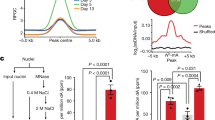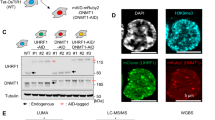Abstract
T-box transcription factor 5 (TBX5) is a member of a phylogenetically conserved family of genes involved in the regulation of developmental processes. The function of TBX5 in cancer development is largely unclear. We identified that TBX5 was preferentially methylated in cancer using methylation-sensitive arbitrarily primed PCR. We aim to clarify the epigenetic inactivation, biological function and clinical significance of TBX5 in colon cancer. Promoter methylation was evaluated by combined bisulfite restriction analysis and bisulfite genomic sequencing. Cell proliferation was examined by cell viability assay and colony formation assay, apoptosis by flow cytometry and cell migration by wound-healing assay. TBX5 target genes were identified by cDNA microarray analysis. Cox regression model and log-rank test were used to identify independent predictors of prognosis. TBX5 was silenced or downregulated in 88% (7/8) colon cancer cell lines, but was expressed in normal colon tissues. Loss of gene expression was associated with promoter methylation. The biological function of TBX5 in human colon cancer cells was examined. Re-expression of TBX5 in silenced colon cancer cell lines suppressed colony formation (P<0.001), proliferation (P<0.001), migration and induced apoptosis (P<0.01). Induction of apoptosis was mediated through cross-talk of extrinsic apoptosis pathway, apoptotic BCL2-associated X protein and Granzyme A signaling cascades. TBX5 suppressed tumor cell proliferation and metastasis through the upregulation of cyclin-dependent kinase inhibitor 2A, metastasis suppressor 1 and downregulation of synuclein gamma and metastasis-associated protein 1 family member 2. TBX5 methylation was detected in 68% (71/105) of primary colon tumors. Multivariate analysis showed that patients with TBX5 methylation had a significantly poor overall survival (P=0.0007). In conclusion, we identified a novel functional tumor suppressor gene TBX5 inactivated by promoter methylation in colon cancer. Detection of methylated TBX5 may serve as a potential biomarker for the prognosis of this malignancy.
This is a preview of subscription content, access via your institution
Access options
Subscribe to this journal
Receive 50 print issues and online access
$259.00 per year
only $5.18 per issue
Buy this article
- Purchase on Springer Link
- Instant access to full article PDF
Prices may be subject to local taxes which are calculated during checkout





Similar content being viewed by others
Abbreviations
- BAX:
-
BCL2-associated X protein
- BGS:
-
bisulfite genomic sequencing
- CDKN2A:
-
cyclin-dependent kinase inhibitor 2A
- CI:
-
confidence interval
- COBRA:
-
combined bisulfite restriction analysis
- MTA2:
-
metastasis-associated 1 family member 2
- MTSS1:
-
metastasis suppressor 1
- RR:
-
relative risks
- RT–PCR:
-
reverse transcript–PCR
- TBX5:
-
T-box transcription factor 5
- SNCG:
-
synuclein gamma
- TNFα:
-
tumor necrosis factor alpha
- TNFRSF:
-
tumor necrosis factor receptor superfamily member
- 5-aza:
-
5-aza-2′-deoxycytidine
References
Balkwill F . (2009). Tumour necrosis factor and cancer. Nat Rev Cancer 9: 361–371.
Barton CA, Hacker NF, Clark SJ, O'Brien PM . (2008). DNA methylation changes in ovarian cancer: implications for early diagnosis, prognosis and treatment. Gynecol Oncol 109: 129–139.
Cai CL, Zhou W, Yang L, Bu L, Qyang Y, Zhang X et al. (2005). T-box genes coordinate regional rates of proliferation and regional specification during cardiogenesis. Development 132: 2475–2487.
Chowdhury D, Lieberman J . (2008). Death by a thousand cuts: granzyme pathways of programmed cell death. Annu Rev Immunol 26: 389–420.
Cullen SP, Brunet M, Martin SJ . (2010). Granzymes in cancer and immunity. Cell Death Differ 17: 616–623.
Finotto S . (2008). T-cell regulation in asthmatic diseases. Chem Immunol Allergy 94: 83–92.
Grady WM, Carethers JM . (2008). Genomic and epigenetic instability in colorectal cancer pathogenesis. Gastroenterology 135: 1079–1099.
Greene FL, Page DL, Fleming ID, Fritz A, Balch CM, Haller DG et al. (2002). TNM Classification of Malignant Tumours. AJCC Cancer Staging Manual, 6th edn. Springer-Verlag: New York.
Gupta A, Godwin AK, Vanderveer L, Lu A, Liu J . (2003a). Hypomethylation of the synuclein gamma gene CpG island promotes its aberrant expression in breast carcinoma and ovarian carcinoma. Cancer Res 63: 664–673.
Gupta A, Inaba S, Wong OK, Fang G, Liu J . (2003b). Breast cancer-specific gene 1 interacts with the mitotic checkpoint kinase BubR1. Oncogene 22: 7593–7599.
He ML, Chen Y, Peng Y, Jin D, Du D, Wu J et al. (2002). Induction of apoptosis and inhibition of cell growth by developmental regulator hTBX5. Biochem Biophys Res Commun 297: 185–192.
Hicks DG, Yoder BJ, Short S, Tarr S, Prescott N, Crowe JP et al. (2006). Loss of breast cancer metastasis suppressor 1 protein expression predicts reduced disease-free survival in subsets of breast cancer patients. Clin Cancer Res 12: 6702–6708.
Holoch PA, Griffith TS . (2009). TNF-related apoptosis-inducing ligand (TRAIL): a new path to anti-cancer therapies. Eur J Pharmacol 625: 63–72.
Hu H, Sun L, Guo C, Liu Q, Zhou Z, Peng L et al. (2009). Tumor cell–microenvironment interaction models coupled with clinical validation reveal CCL2 and SNCG as two predictors of colorectal cancer hepatic metastasis. Clin Cancer Res 15: 5485–5493.
Johnstone RW, Frew AJ, Smyth MJ . (2008). The TRAIL apoptotic pathway in cancer onset, progression and therapy. Nat Rev Cancer 8: 782–798.
Kim WY, Sharpless NE . (2006). The regulation of INK4/ARF in cancer and aging. Cell 127: 265–275.
Liu H, Liu W, Wu Y, Zhou Y, Xue R, Luo C et al. (2005). Loss of epigenetic control of synuclein-gamma gene as a molecular indicator of metastasis in a wide range of human cancers. Cancer Res 65: 7635–7643.
Liu YE, Pu W, Jiang Y, Shi D, Dackour R, Shi YE . (2007). Chaperoning of estrogen receptor and induction of mammary gland proliferation by neuronal protein synuclein gamma. Oncogene 26: 2115–2125.
Maitra M, Schluterman MK, Nichols HA, Richardson JA, Lo CW, Srivastava D et al. (2009). Interaction of Gata4 and Gata6 with Tbx5 is critical for normal cardiac development. Dev Biol 326: 368–377.
Mori AD, Zhu Y, Vahora I, Nieman B, Koshiba-Takeuchi K, Davidson L et al. (2006). Tbx5-dependent rheostatic control of cardiac gene expression and morphogenesis. Dev Biol 297: 566–586.
Nemer M . (2008). Genetic insights into normal and abnormal heart development. Cardiovasc Pathol 17: 48–54.
Newbury-Ecob RA, Leanage R, Raeburn JA, Young ID . (1996). Holt–Oram syndrome: a clinical genetic study. J Med Genet 33: 300–307.
Pan ZZ, Bruening W, Giasson BI, Lee VM, Godwin AK . (2002). Gamma-synuclein promotes cancer cell survival and inhibits stress- and chemotherapy drug-induced apoptosis by modulating MAPK pathways. J Biol Chem 277: 35050–35060.
Papaioannou VE, Silver LM . (1998). The T-box gene family. Bioessays 20: 9–19.
Parkin DM, Bray F, Pisani P . (2005). Global cancer statistics, 2002. CA Cancer J Clin 55: 74–108.
Parr C, Jiang WG . (2009). Metastasis suppressor 1 (MTSS1) demonstrates prognostic value and anti-metastatic properties in breast cancer. Eur J Cancer 45: 1673–1683.
Plageman Jr TF, Yutzey KE . (2006). Microarray analysis of Tbx5-induced genes expressed in the developing heart. Dev Dyn 235: 2868–2880.
Schütze S, Tchikov V, Schneider-Brachert W . (2008). Regulation of TNFR1 and CD95 signalling by receptor compartmentalization. Nat Rev Mol Cell Biol 9: 655–662.
Taylor RC, Cullen SP, Martin SJ . (2008). Apoptosis: controlled demolition at the cellular level. Nat Rev Mol Cell Biol 9: 231–241.
Toh Y, Nicolson GL . (2009). The role of the MTA family and their encoded proteins in human cancers: molecular functions and clinical implications. Clin Exp Metas 26: 215–227.
Yanagawa N, Tamura G, Honda T, Endoh M, Nishizuka S, Motoyama T . (2004). Demethylation of the synuclein gamma gene CpG island in primary gastric cancers and gastric cancer cell lines. Clin Cancer Res 10: 2447–2451.
Yu J, Cheng YY, Tao Q, Cheung KF, Lam CN, Geng H et al. (2009a). Methylation of protocadherin 10, a novel tumor suppressor, is associated with poor prognosis in patients with gastric cancer. Gastroenterology 136: 640–651.
Yu J, Tao Q, Cheng YY, Lee KY, Ng SS, Cheung KF et al. (2009b). Promoter methylation of the Wnt/beta-catenin signaling antagonist Dkk-3 is associated with poor survival in gastric cancer. Cancer 115: 49–60.
Zitt M, Zitt M, Müller HM . (2007). DNA methylation in colorectal cancer—impact on screening and therapy monitoring modalities? Dis Markers 23: 51–71.
Acknowledgements
This work was supported by research grant of Council Competitive Earmarked Research Grant CUHK (473008).
Author information
Authors and Affiliations
Corresponding author
Ethics declarations
Competing interests
The authors declare no conflict of interest.
Additional information
Supplementary Information accompanies the paper on the Oncogene website
Supplementary information
Rights and permissions
About this article
Cite this article
Yu, J., Ma, X., Cheung, K. et al. Epigenetic inactivation of T-box transcription factor 5, a novel tumor suppressor gene, is associated with colon cancer. Oncogene 29, 6464–6474 (2010). https://doi.org/10.1038/onc.2010.370
Received:
Revised:
Accepted:
Published:
Issue Date:
DOI: https://doi.org/10.1038/onc.2010.370
Keywords
This article is cited by
-
The benign nature and rare occurrence of cardiac myxoma as a possible consequence of the limited cardiac proliferative/ regenerative potential: a systematic review
BMC Cancer (2023)
-
The overexpression and clinical significance of TBX15 in human gliomas
Scientific Reports (2023)
-
T-box transcription factor 19 promotes hepatocellular carcinoma metastasis through upregulating EGFR and RAC1
Oncogene (2022)
-
Combined genetic mutations and DNA-methylated genes as biomarkers for endometrial cancer detection from cervical scrapings
Clinical Epigenetics (2019)
-
Identification and functional analysis of genetic variants in TBX5 gene promoter in patients with acute myocardial infarction
BMC Cardiovascular Disorders (2019)



